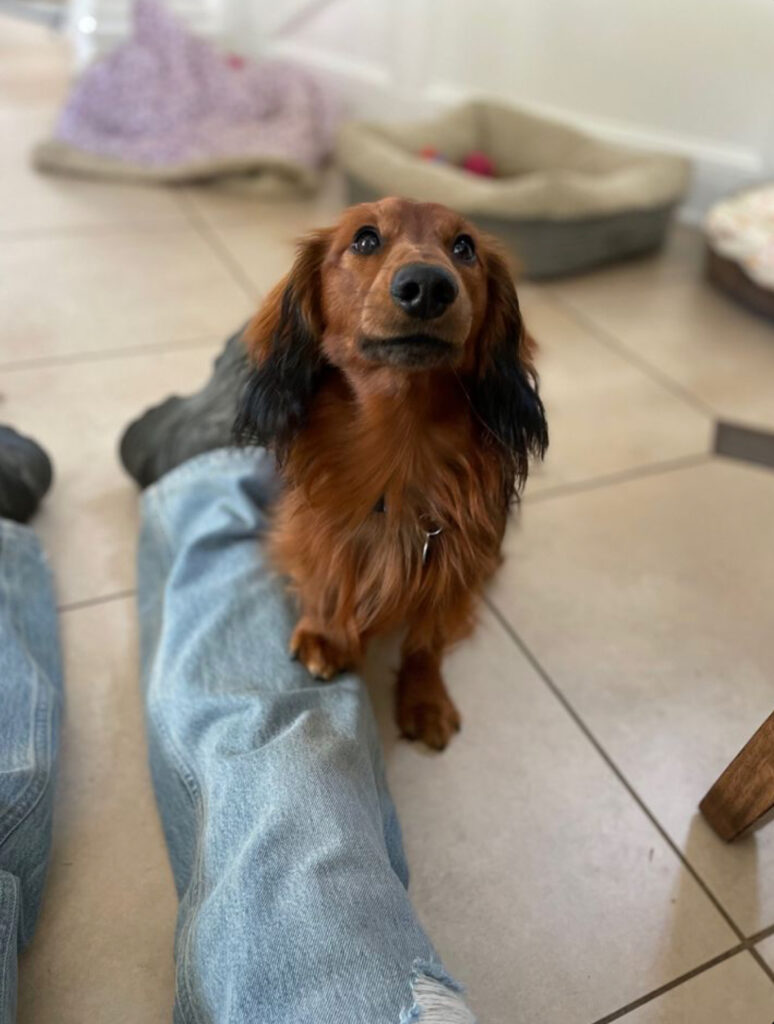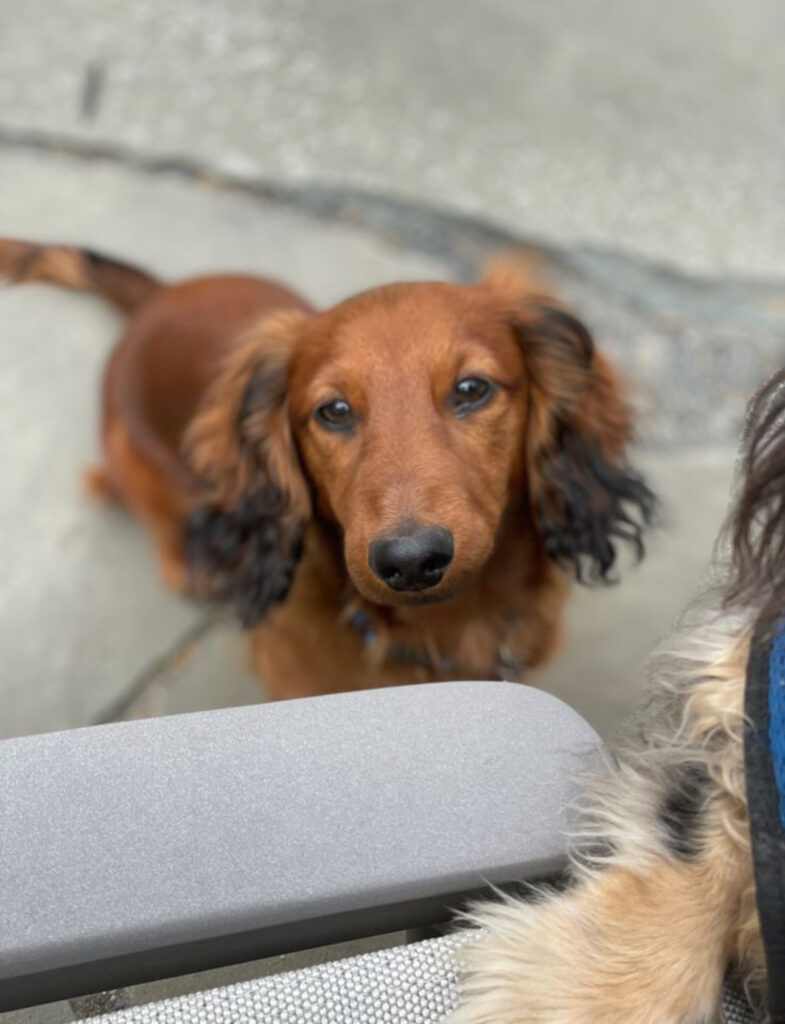Why Knowing the Ideal Weight for Long Haired Dachshunds Is So Important
As a Mini Dachshund breeder in California, one of the most common questions I hear from new puppy families is: “How much should my long haired Dachshund weigh?”
It’s a great question — because getting your Doxie’s weight right is about a lot more than looks. For long haired Dachshunds, staying in their ideal weight range can help prevent back injuries, support joint health, and even make grooming easier.
In this guide, I’ll walk you through the ideal weight for long haired Dachshund dogs, how to know if your pup is over or under, and how to maintain their healthiest body condition for life.
What Is the Ideal Weight for a Mini Long Haired Dachshund?
Weight Guidelines by Size Class
There are two general categories of Dachshunds — Miniature and Standard. Most long haired Dachshunds I raise and sell fall into the Miniature category.
- Miniature Dachshund: 8 to 11 pounds
- Tweenie (unofficial mid-size): 12 to 15 pounds
- Standard Dachshund: 16 to 32 pounds
A true Miniature Doxie shouldn’t exceed 11 pounds as an adult. Occasionally, I’ll have a “tweenie” pup — usually when both parents have larger frames — and that’s okay as long as they’re fit, not fat.

Why Maintaining a Healthy Dachshund Weight Matters
1. Reduces Risk of IVDD
Their long spine puts them at higher risk for Intervertebral Disc Disease. Keeping them at their ideal weight reduces the pressure on their back.
2. Better Energy, Less Joint Strain
Lightweight dogs move more freely and are less prone to hip and knee issues. My dogs who maintain a healthy weight stay active well into their senior years.
3. Easier Grooming and Coat Care
Extra pounds can cause folds and hot spots under their beautiful coats — especially in warmer weather. The less excess fat, the easier it is to groom and spot-check skin.
How to Tell If Your Long Haired Dachshund Is at a Healthy Weight
You don’t need a scale to make a quick body check at home.
The Rib Test
- Run your fingers along your dog’s sides.
- You should feel the ribs without pressing hard — but not see them.
The Waist Test
- Look from above: your Doxie should have a visible tuck behind the ribs.
- If their waist blends with their chest, they’re likely overweight.
Signs Your Doxie Might Be Overweight
- Panting during light activity
- Struggling to jump or climb stairs
- Needing to “scoot” off furniture instead of hopping down
- Fat deposits at the neck or above the tail
Factors That Affect Long Haired Dachshund Weight
Age
- Puppies are usually leaner and hit their adult weight by 10–12 months.
- Seniors may lose muscle tone or gain fat with reduced activity.
Spay/Neuter Status
Fixed dogs sometimes need fewer calories due to slower metabolism.
Genetics and Bone Structure
Some Dachshunds are naturally petite, others stockier. I always tell puppy buyers: weight isn’t a one-size-fits-all — it’s about condition, not just the number.

How to Keep Your Long Haired Dachshund at Their Ideal Weight
1. Feed Smart
Choose a high-quality kibble formulated for small breeds. Avoid foods with corn, soy, or artificial fillers.
I recommend:
- Royal Canin Mini Adult
- Wellness Core Small Breed
- The Farmer’s Dog (fresh food)
Stick to measured meals twice a day — no free-feeding.
2. Treat in Moderation
Use low-calorie training treats or break larger ones into pieces. A few of my favorite healthy options:
- Freeze-dried chicken
- Carrot sticks
- Single-ingredient chews
3. Get Daily Exercise
Even short-legged dogs need movement! Mine go for:
- 20–30 minute walks
- Indoor fetch or playtime
- Low-impact games like puzzle toys
Avoid excessive jumping or stairs to protect their back.

What I Feed at My Kennel and Recommend to Puppy Families
At Dachshund Paradise, I feed:
- Puppies: Royal Canin Mini Puppy
- Adults: Wellness Small Breed or The Farmer’s Dog
New owners get a puppy starter pack with:
- A food sample
- Feeding guidelines
- Body condition photo chart
- Growth tracking worksheet
One of my favorite success stories: A first-time puppy owner followed our guide to the letter, and their pup maintained perfect weight from week 9 through their 1-year checkup. Their vet called it “textbook healthy.”

Frequently Asked Questions
How much should a long haired Mini Dachshund weigh at full maturity?
Typically 8–11 pounds, depending on frame and body condition.
Can a Dachshund be overweight at 13 pounds?
Yes, if their frame is mini. If they have no waist or you can’t feel ribs, it’s time to cut back food and add more activity.
Should I switch food if my Dachshund is gaining weight?
Sometimes — especially if it’s high in fat or calories. But start by adjusting portions and limiting treats first.
Conclusion: Why the Ideal Weight for Long Haired Dachshund Dogs Is More Than a Number
Keeping your dog at the ideal weight for long haired Dachshund health isn’t about hitting a number — it’s about maintaining muscle tone, joint protection, and coat quality. With the right diet, daily movement, and regular monitoring, you can help your Dachshund stay trim, happy, and full of life.
If you’re unsure whether your Doxie is at a healthy weight or you’re getting ready to bring home a puppy, I’m happy to help. Reach out anytime — and be sure to check our Available Puppies Page if you’re looking for a long haired Mini Dachshund with the best possible start. 🐾
